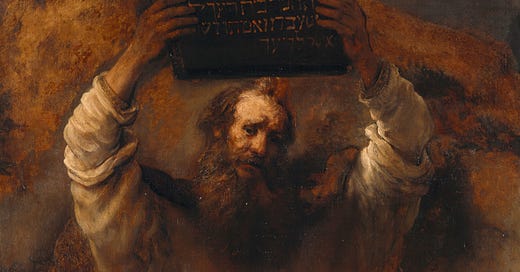Tradition has long taught that Moses wrote the Pentateuch—Genesis, Exodus, Leviticus, Numbers and Deuteronomy. In relatively recent times, however, this belief has been questioned. Many modern scholars have scorned the idea of Mosaic authorship in favor of a more patchwork approach, claiming these books were written by a variety of authors, well after Moses’ death.
Is tradition right, or has modern biblical scholarship uncovered a new insight that our spiritual forefathers neglected to see?
For thousands of years there was very little doubt about the authenticity of Mosaic authorship. However, criticism of this tradition began to take firm room in the nineteenth century when liberal Protestant theologians began a quest to find the supposed “sources” of the Pentateuch. Their claim was that the Pentateuch didn’t date from the time of Moses (either 1400 or 1200 B.C.) but rather from the period after the Babylonian exile (sixth century B.C.).
The speculations and hypotheses of these scholars met their apex with the work of nineteenth century Protestant German biblical scholar, Julius Wellhausen. It was Wellhausen who solidified the so-called “Documentary Hypothesis,” which claimed that the Pentateuch and the sacred Jewish law were later, contrived additions to a previously primitive religion.
Although Wellhausen and those of his school could cite no factual basis for their theories, their persistence took root in scholarly circles to such an extent that they influence scholars even to this day, despite archeological and linguistic evidence that prove otherwise.
What Did the Church Fathers Believe?
Before discussing the Church Fathers, let’s consider what Jesus Himself said. He clearly believed in the Mosaic authorship of the Pentateuch, as attested in various verses in the Gospels including John 5:45-46: “Do not think that I shall accuse you to the Father; it is Moses who accuses you, on whom you set your hope. If you believed Moses, you would believe me, for he wrote of me.”
The Apostolic Fathers and subsequent Ante-Nicene Fathers seemed to have unanimously believed that Moses was the divinely inspired author of the Pentateuch. The only ancient records we have of criticism or doubt to Mosaic authorship comes from either heretical sects intent upon “curtail[ing] any Jewish claims to the divine authority of the Torah” or from pagans seeking to denounce the blossoming faith of Christianity.1
Origen of Alexandria, a second/third century A.D. theologian and one of the Church’s best-known early scholars, frequently wrote in affirmation of the Mosaic authorship of the Pentateuch.2 Other early Church fathers of the second and third centuries who spoke firmly on Mosaic authorship of the Pentateuch include Tertullian, Theophilus of Antioch, Clement of Alexandria, Melito of Sardis, Irenaeus, Justin Martyr, and many more.3
Mosaic Proof in Modern Archeology
In fairly recent times, archeological and linguistic discoveries have proven the Pentateuch to be authentic to the days of Moses. The literary style and structure of Genesis 1-11 clearly demonstrate a stylistic comparability to other literature of the early second millennium B.C., rather than a later dating of 900-400 B.C. as biblical minimalists have attempted to claim.4




